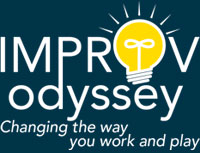Commentary on Spolin’s Tips and Pointers: Part 1
How we do something is the process of doing (right now!). Pre-planning “How” makes process impossible and so becomes resistance to the focus of the exercise, and no “explosion” or spontaneity can take place, making any change or alterations in the student-actor impossible. True improvisation re-shapes and alters the student-actor through the act of improvising itself. Penetration into the focus, connection, and a live relation with fellow players result in a change, alteration, or new understanding for one or the other or both. In time, during the solving of the acting problem the student becomes aware of being acted upon and of acting, thereby creating process and change within his or her stage life. The intuition gained remains with the player in everyday life, for whenever a circuit is opened for anyone, so to speak, it is usable everywhere. read more →
Play is Essential to Life & Work
I got this link from a colleague, Rob Adler. Again, here is someone else who sees what we need as a society and how important play is. This argues for the same paradigm shift Improv Odyssey advocates. There are people out there who can lead you back to that essential ingredient that not only relieves.. read more →
The Magic Bond of Playing
After 35 years of playing Spolin Games with various groups, I’ve noticed an interesting thing. I am struck by the fact that these groups as a result of playing together for an extended period, keep in touch with each other and often come together to play as opportunity permits. My first observation of this phenomenon.. read more →
Finding Happiness in Life & Work
Playing games teaches a basic morality. This morality comes from the fact that in order to have fun playing the game, one must follow the rules. It is the rules of the game that allows us to get the fun out of playing. Games present challenges and meeting those challenges constitutes fun. Subverting those challenges.. read more →
Does Teaching mean you have to be Mean?
Michael wrote as a comment to me regarding another post: Is it my imagination or did a lot of the famous improv teachers yell at their students? Sounds like Viola did. People said Del Close was often a huge dick to his students. Keith Johnstone was famous for calling a student’s work horrible and telling.. read more →
A Question of Evaluating Students
I recently got a letter from a teacher who uses Spolin Games in the classroom. She asked an interesting question: …Here’s my question: what theatre game would you recommend I use in evaluating the ability level or strength of a 4-6 grader performing improvisation? In other words, which game might let me know which student.. read more →
NO FAIL NO FEAR
“I don’t believe in success and failure.” – Viola Spolin. We all approach new things with some trepidation. I’ve been told by new students that they are there in the workshop because Improv terrifies them and they want to face that fear. Bravo to them for their courage, but ‘sheesh!” I tell them that they.. read more →
Direct Experience and Peak Experiences
“What we are after is a direct experience!” — Viola Spolin I used to think that a direct experience is the same as what Abraham Maslow called the ‘peak experience’. Maslow coined the term to describe what other people have referred to as a ‘religious experience’ as in a born again feeling where the subject.. read more →
Playing Creates Community
In our ever more complex and technological era, true person to person interaction is lost as we interact with each other via technology instead. (witness this blog) The technological revolution has brought us closer in one respect, but the need to interact in a wholesome way within our local community, person to person, is still.. read more →
How to Leave Your Ego at the Door
“Enough about me… What do you think about me?” Making Your Partner Look Good “Make your partner look good!” is a coach used in current improvisational training. The reason this coach is valuable is because it is based on the idea that there is more opportunity for good improv by being more concerned with your.. read more →








